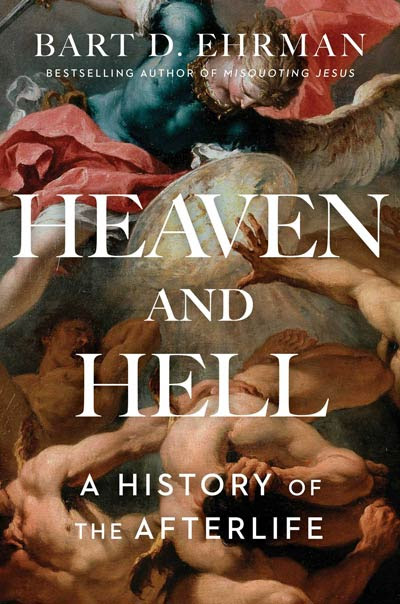SCIENCE SALON # 110
Michael Shermer with Bart Ehrman — Heaven and Hell: A History of the Afterlife
According to a recent Pew Research poll, 72% of Americans believe in a literal heaven and 58% in a literal hell (more evidence of the over-optimism bias and self-serving bias). Worldwide, over two billion Christians believe that because of their faith they will have a glorious afterlife. And nearly everyone wonders about what, if anything, comes after death. In Heaven and Hell, renowned biblical scholar and historian of religion Dr. Bart Ehrman investigates the powerful instincts that gave rise to the common ideas of heaven and hell and that help them endure. From the Epic of Gilgamesh to the writings of Augustine, Ehrman recounts the long history of the life after death. In different times, places, and cultures, people held a wide variety of views, and Ehrman is adept at showing how these influenced one another and changed in response to their historical, social, and cultural situations. His driving question is why and how Christians came up with the idea that souls will experience either eternal bliss or everlasting torment. Ehrman shows that the historical Jesus, Paul, and the author of Revelation would have been utterly perplexed by such ideas. These ideas are later Christian developments. Shermer and Ehrman also discuss:
- Ehrman’s personal journey from Christian to nonbeliever
- the earliest writings on the afterlife
- why the Old Testament says nothing about Heaven and Hell
- what the New Testament says about Heaven and Hell
- early pagan influences on Judaism and Christianity
- who invented the afterlife and why
- what Jesus really said about the afterlife, souls, and immortality
- what commoners believed about the afterlife in Greek, Roman and biblical times
- myths, stories, and parables: their original meaning and use
- the real meaning of the resurrection
- Is the Kingdom of Heaven within us all?
- What does a nonbeliever say to a believer about the (non-existence) of the afterlife?
Bart D. Ehrman is a leading authority on the New Testament and the history of early Christianity, and the author or editor of more than thirty books, including the New York Times bestsellers Misquoting Jesus, How Jesus Became God, and The Triumph of Christianity. A Distinguished Professor of Religious Studies at the University of North Carolina at Chapel Hill, he has created eight popular audio and video courses for The Great Courses. He has been featured in Time, The New Yorker, and The Washington Post, and has appeared on NBC, CNN, The Daily Show with Jon Stewart, the History Channel, the National Geographic Channel, BBC, and NPR.
Listen to Science Salon via Apple Podcasts, Spotify, Google Play Music, Stitcher, iHeartRadio, and TuneIn.

It has always fascinated me how some people can believe in a literal heaven but not a literal hell. It seems to be another example of religious people "cherry picking" from the bible. One one hand, cherry picking tends to result in less extreme religious views, which I think is a good thing. But on the other hand, I find the inconsistencies to be rather frustrating.
ReplyDeleteOn the OTHER other hand...
DeleteI heard a lot more, from the Southern Baptists of my childhood, about hell than heaven. They picked the rotten cherries, and always seemed more intent on frightening us of eternal damnation than enticing us with the promise of eternal life.
This post reminded me of this link to philosophy related videos and classes, for any who don’t already have enough to watch.
ReplyDeleteHow to Teach and Learn Philosophy During the Pandemic: A Collection of 450+ Course Videos Free Online
http://www.openculture.com/2020/03/how-to-teach-and-learn-philosophy-during-the-pandemic.html